Death Watch
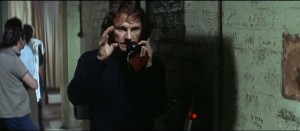 Just because you’re prescient, doesn’t make you smart. It might be an accident. Take Richard Brooks’ Wrong is Right, his penultimate film (and his second looniest, behind his final film Fever Pitch), made 5 years after his last studio film, 1977’s Looking for Mr. Goodbar. Now Wrong is Right appears to have guessed right in terms of predicting many major world events, it involves the US starting a questionable war in the middle east because they claim to have found weapons of mass destruction, but they really are just after oil. Their attack is justified by the discovery of atomic bombs on the roof of the World Trade Center, while there’s another threat to bomb Israel. Frighteningly accurate. And it’s appropriately a black comedy about media exploitation as a reporter (Sean Connery) goes into a war zone with the goal of capturing death on camera to boost ratings.
Just because you’re prescient, doesn’t make you smart. It might be an accident. Take Richard Brooks’ Wrong is Right, his penultimate film (and his second looniest, behind his final film Fever Pitch), made 5 years after his last studio film, 1977’s Looking for Mr. Goodbar. Now Wrong is Right appears to have guessed right in terms of predicting many major world events, it involves the US starting a questionable war in the middle east because they claim to have found weapons of mass destruction, but they really are just after oil. Their attack is justified by the discovery of atomic bombs on the roof of the World Trade Center, while there’s another threat to bomb Israel. Frighteningly accurate. And it’s appropriately a black comedy about media exploitation as a reporter (Sean Connery) goes into a war zone with the goal of capturing death on camera to boost ratings.
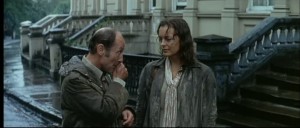 Unfortunately Brooks was still making films in a 1950s style, so the TV stuff in Wrong is Right looks phony and dated, the satire extraordinarily heavy-handed, the special effects laughable, and the jokes are disorganized and scattered. The movie is also criminally overstuffed, distracted, poorly paced, and all of the negative things you could say about a comedy that fails, even if Brooks was able to perfectly predict our political climate and the 24 hour news channels. As the cliché goes, even a broken clock is right twice a day.
Unfortunately Brooks was still making films in a 1950s style, so the TV stuff in Wrong is Right looks phony and dated, the satire extraordinarily heavy-handed, the special effects laughable, and the jokes are disorganized and scattered. The movie is also criminally overstuffed, distracted, poorly paced, and all of the negative things you could say about a comedy that fails, even if Brooks was able to perfectly predict our political climate and the 24 hour news channels. As the cliché goes, even a broken clock is right twice a day.
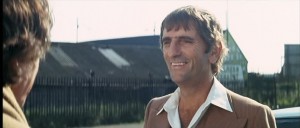 Now Bertrand Tavernier’s Death Watch (shot in 1979, released in the US in 1982) is another eerily prescient film from the same time period as Wrong is Right, also covering the media exploitation of death. But it’s a considerably more focused film. Tavernier’s film is futuristic without actually stating when it takes place. And the fact that its protagonists wander off into the wilderness to escape the technology that has taken over people’s lives, brings to mind other similar films like Children of Men, Never Let Me Go, and Louis Malle’s Black Moon, which also exist in an alternate universe that still functions as “now.”
Now Bertrand Tavernier’s Death Watch (shot in 1979, released in the US in 1982) is another eerily prescient film from the same time period as Wrong is Right, also covering the media exploitation of death. But it’s a considerably more focused film. Tavernier’s film is futuristic without actually stating when it takes place. And the fact that its protagonists wander off into the wilderness to escape the technology that has taken over people’s lives, brings to mind other similar films like Children of Men, Never Let Me Go, and Louis Malle’s Black Moon, which also exist in an alternate universe that still functions as “now.”
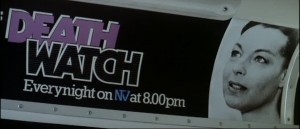 All four films also fall under the influence of author Philip K. Dick, whose sci-fi novels that have been adapted into films like Blade Runner, Total Recall, Minority Report, and The Adjustment Bureau, not only have sharply satirical points to make about the evil impersonality of technology, but also have their characters trying to outrun what they have relied on in what they perceived were normal lives. With Death Watch, Tavernier was finally given some money to work with and a chance to expand his audience by shooting a film in English and featuring mainstream stars (Harvey Keitel, Max Von Sydow, Romy Schneider, Harry Dean Stanton).
All four films also fall under the influence of author Philip K. Dick, whose sci-fi novels that have been adapted into films like Blade Runner, Total Recall, Minority Report, and The Adjustment Bureau, not only have sharply satirical points to make about the evil impersonality of technology, but also have their characters trying to outrun what they have relied on in what they perceived were normal lives. With Death Watch, Tavernier was finally given some money to work with and a chance to expand his audience by shooting a film in English and featuring mainstream stars (Harvey Keitel, Max Von Sydow, Romy Schneider, Harry Dean Stanton).
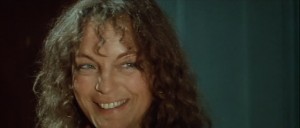 Tavernier’s response was to make a film in a more European way than what might be acceptable to American audiences. The camerawork is ambitious but not showoffy (long tracking shots that don’t call too much attention to themselves), the futuristic technology, such as the camera placed behind Harvey Keitel’s eyes so he can follow the terminally ill Romy Schneider without her knowing, is described but never seen, and the final act is meandering and ponderous and doesn’t build to a conventional conclusion (apart from the notion of being, in essence, a “chase picture”). Everything about Death Watch is low tech; when sleazy TV producer Harry Dean Stanton is trying to find the right subject for his TV show, he watches doctors giving bad news to their patients, and he does so behind a one-way mirror.
Tavernier’s response was to make a film in a more European way than what might be acceptable to American audiences. The camerawork is ambitious but not showoffy (long tracking shots that don’t call too much attention to themselves), the futuristic technology, such as the camera placed behind Harvey Keitel’s eyes so he can follow the terminally ill Romy Schneider without her knowing, is described but never seen, and the final act is meandering and ponderous and doesn’t build to a conventional conclusion (apart from the notion of being, in essence, a “chase picture”). Everything about Death Watch is low tech; when sleazy TV producer Harry Dean Stanton is trying to find the right subject for his TV show, he watches doctors giving bad news to their patients, and he does so behind a one-way mirror.
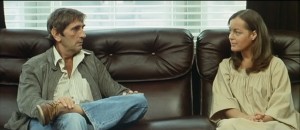 These choices are what allow Tavernier (and/or the David Compton novel* the film is based on) to get away with some of the hammier, sloppier decisions, such as Schneider’s character having the name Mortenhoe (Mort = Death) and her husband given the last name Graves. That the doctor who tells Schneider she doesn’t have long to live seems complicit in the TV show before we’re even aware of the fact that in this society, very few people die of illness anymore, would be a glaring error that gives away future events. But in this low-rent future, it just looks like he’s nervous and self-conscious about his predicament**. Harry Dean Stanton’s character is aware of the discomfort and exploits it because that’s all he knows how to do. His office has posters of science experiments gone wrong movies like The Incredible Shrinking Man and his conception of having Keitel follow this woman around with the camera behind his eyes is right out of 1950s sci-fi like X: The Man with the X-Ray Eyes. None of it is real to him. He lacks any awareness of reality at all; otherwise he never would leave the house wearing loafers without socks.
These choices are what allow Tavernier (and/or the David Compton novel* the film is based on) to get away with some of the hammier, sloppier decisions, such as Schneider’s character having the name Mortenhoe (Mort = Death) and her husband given the last name Graves. That the doctor who tells Schneider she doesn’t have long to live seems complicit in the TV show before we’re even aware of the fact that in this society, very few people die of illness anymore, would be a glaring error that gives away future events. But in this low-rent future, it just looks like he’s nervous and self-conscious about his predicament**. Harry Dean Stanton’s character is aware of the discomfort and exploits it because that’s all he knows how to do. His office has posters of science experiments gone wrong movies like The Incredible Shrinking Man and his conception of having Keitel follow this woman around with the camera behind his eyes is right out of 1950s sci-fi like X: The Man with the X-Ray Eyes. None of it is real to him. He lacks any awareness of reality at all; otherwise he never would leave the house wearing loafers without socks.
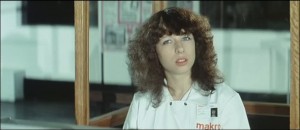 The entire cast is trapped in Stanton’s awkward soap opera world, so even potential plot hole details like the fact that no one ever tells Schneider that Keitel is not her friend but taking advantage of her for the titular television show, is just another melodramatic additive that a soap opera requires. As Schneider says, “everything’s of interest, but nothing matters.”
The entire cast is trapped in Stanton’s awkward soap opera world, so even potential plot hole details like the fact that no one ever tells Schneider that Keitel is not her friend but taking advantage of her for the titular television show, is just another melodramatic additive that a soap opera requires. As Schneider says, “everything’s of interest, but nothing matters.”
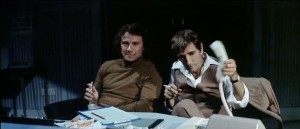 Tavernier will then slip some subtle touch into the film that seems meaningless that would normally have a big circle around it and an arrow pointing at it and saying “look at me, I’m important,” but just reinforcing the droning, impersonal nature of this particular society. There’s the fact that society has been drugging themselves out of feeling pain, isolating the elderly, and having computers write romance novels with a program that makes artistic decisions via the equivalent of Mad Libs. And when Keitel and Schneider are on the run and stop in a supermarket, the check-out girl is watching Death Watch never even recognizes Schneider. Instead, in a self-congratulatory fashion, she explains why she watches it; “it makes me cry.” It’s obviously one of Tavernier’s broader points, that people would rather watch “reality” than actually experience life*** (even more relevant now that people endlessly record video with their Iphone instead of actually just letting the moment happen).
Tavernier will then slip some subtle touch into the film that seems meaningless that would normally have a big circle around it and an arrow pointing at it and saying “look at me, I’m important,” but just reinforcing the droning, impersonal nature of this particular society. There’s the fact that society has been drugging themselves out of feeling pain, isolating the elderly, and having computers write romance novels with a program that makes artistic decisions via the equivalent of Mad Libs. And when Keitel and Schneider are on the run and stop in a supermarket, the check-out girl is watching Death Watch never even recognizes Schneider. Instead, in a self-congratulatory fashion, she explains why she watches it; “it makes me cry.” It’s obviously one of Tavernier’s broader points, that people would rather watch “reality” than actually experience life*** (even more relevant now that people endlessly record video with their Iphone instead of actually just letting the moment happen).
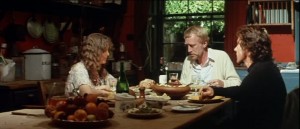 And if you missed anything, Max Von Sydow’s cameo in the final scenes makes sure to hammer it home. It’s not enough that Von Sydow brings to mind his role in The Seventh Seal, another film about being uncomfortably aware of your impending death, but Von Sydow is the wise old soul who can lecture all of the characters and espouse all necessary wisdom. Other characters are considerably more playful than Von Sydow, such as when Keitel enthusiastically cranes his neck like a bird when he has just had the camera put in, or Schneider’s insistence on going to a low-rent amusement park/street fair to celebrate the money she will receive for participating in the show. Von Sydow is there to judge all of us, and be the elitist, omniscient narrator of sorts. It’s a shame he didn’t say anything to Harry Dean Stanton about wearing socks with his loafers.
And if you missed anything, Max Von Sydow’s cameo in the final scenes makes sure to hammer it home. It’s not enough that Von Sydow brings to mind his role in The Seventh Seal, another film about being uncomfortably aware of your impending death, but Von Sydow is the wise old soul who can lecture all of the characters and espouse all necessary wisdom. Other characters are considerably more playful than Von Sydow, such as when Keitel enthusiastically cranes his neck like a bird when he has just had the camera put in, or Schneider’s insistence on going to a low-rent amusement park/street fair to celebrate the money she will receive for participating in the show. Von Sydow is there to judge all of us, and be the elitist, omniscient narrator of sorts. It’s a shame he didn’t say anything to Harry Dean Stanton about wearing socks with his loafers.
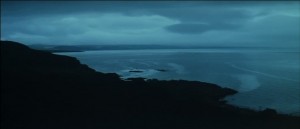 * The novel is called “The Continuous Katherine Mortenhoe, or The Unsleeping Eye.”
* The novel is called “The Continuous Katherine Mortenhoe, or The Unsleeping Eye.”
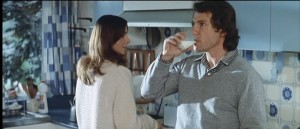 ** Equally awkward is Robbie Coltrane’s performance as bodyguard/limo driver for Schneider. This was Coltrane’s first film and he has a deer-in-headlights look throughout, which distracts you from the fact that he’s a dead ringer for disgraced pitcher Roger Clemens.
** Equally awkward is Robbie Coltrane’s performance as bodyguard/limo driver for Schneider. This was Coltrane’s first film and he has a deer-in-headlights look throughout, which distracts you from the fact that he’s a dead ringer for disgraced pitcher Roger Clemens.
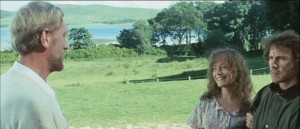 *** Death Watch was finished the same year as Albert Brooks’ Real Life, which similarly deals with and predicts the dangers of reality television. Real Life has a clarity of vision that Death Watch lacks, which is often an aimless movie with great ideas. It’s easy to see where films like The Truman Show and Pleasantville came from when you see Real Life, not so much with Death Watch.
*** Death Watch was finished the same year as Albert Brooks’ Real Life, which similarly deals with and predicts the dangers of reality television. Real Life has a clarity of vision that Death Watch lacks, which is often an aimless movie with great ideas. It’s easy to see where films like The Truman Show and Pleasantville came from when you see Real Life, not so much with Death Watch.



